If your periods are missed and you’ve taken a pregnancy test that came back negative, it can be concerning, especially if you were trying to conceive. You might wonder what could have gone wrong that led to missed periods but not pregnant. Even if you weren’t trying for pregnancy, irregular periods or missed cycles for a month or two can be worrying. So, what could be the reasons for missed periods?
In this blog, we’ll explore the possible causes of hormonal imbalance and why missed periods occur, offering insights that could be useful.
I’m Dr. Amita Shah, a senior consultant gynecologist and laparoscopic surgeon practicing in Gurgaon. Let’s delve into this important topic.
Understanding Missed Periods and Not Pregnant
Even if your pregnancy test is negative, it’s important to understand the reason for hormonal imbalance and how it can affect your menstrual cycle. First, you need to know how and why periods come regularly. The menstrual cycle is regulated by two hormones secreted by our brain, known as LH (Luteinizing Hormone) and FSH (Follicle-Stimulating Hormone).
These hormones act on your ovaries, leading to the production of two other hormones: estrogen and progesterone. These hormones are responsible for building up the lining of the uterus. When pregnancy does not occur, the levels of these hormones drop, causing the uterine lining to shed, which is what we recognize as a period.
Essentially, your periods come regularly due to the regulation of these hormones. If there are any factors that cause these hormones to become irregular, your periods may also become irregular or be missed altogether. Understanding these factors is crucial to addressing hormonal imbalance in women and why missed periods symptoms can appear even when a pregnancy test is negative.
Common Causes of Missed Periods
-
Stress
Stress is a significant factor affecting hormonal balance. When you experience stress or sudden lifestyle changes, it can disrupt the release of LH and FSH, leading to irregular cycles or missed periods but not pregnant. Once the stressful situation resolves, your periods often return to normal within a month or two.
-
Sudden Weight Changes
A rapid increase or decrease in weight around 5 to 6 kilograms within one to two months can disrupt hormone metabolism. This affects estrogen and progesterone levels, resulting in hormonal imbalance symptoms like irregular or missed periods.
-
Hormonal Imbalance
Certain hormones can directly impact your menstrual cycle. Prolactin is an important hormone that increases during breastfeeding, which is why periods may not resume for some time. An elevated level of prolactin (hyperprolactinemia) can disrupt ovarian hormone release, leading to missed periods but no pregnancy symptoms. This hormonal imbalance in women can make it difficult to identify the underlying issue without further testing.
Thyroid hormones also play a role. Whether they are overactive (hyperthyroidism) or underactive (hypothyroidism), changes in thyroid hormone levels can disrupt the balance of estrogen and progesterone, affecting your cycle.
If you experience irregular cycles, a hormonal imbalance test can help determine your hormone levels and identify if you need hormonal imbalance medicine or lifestyle changes to restore balance.
-
Polycystic Ovary Syndrome (PCOS)
PCOS has become increasingly common and affects many women with hormonal imbalance. It leads to hormonal irregularities, including elevated levels of male hormones like testosterone. These hormonal imbalances are among the reasons for missed periods. Symptoms may include irregular periods, acne, abnormal hair growth, weight fluctuations, and sometimes infertility. Treatment options are available, and understanding how to cure hormonal imbalance in women can help manage PCOS more effectively.
-
Medications
Certain medications, particularly oral contraceptives, can affect your periods. If you’ve been taking oral contraceptives for an extended time and then stop, it might take a couple of months for your cycle to regulate. This condition is known as post-pill amenorrhea.
Intrauterine devices (IUDs), like Mirena, can also lead to missed periods as one of the reasons why missed period can occur, since they release hormones that can significantly reduce menstrual flow.
Injectable contraceptives (like DMPA) given every three months can similarly result in missed or scanty periods.
-
Other Factors
Emergency contraceptives (like the “morning-after pill”) contain high levels of hormones, which can lead to irregular cycles and missed periods symptoms. This hormonal fluctuation is one of the reasons for hormonal imbalance.
Additionally, surgical procedures like D&C (dilation and curettage) performed after an abortion can sometimes lead to missed periods due to scarring or the formation of adhesions in the uterus, a condition known as Asherman’s syndrome.
Conclusion
If you’ve missed your periods and are feeling concerned, it’s crucial to reach out to a healthcare provider. A professional can assess your situation, determine the causes of hormonal imbalance, and suggest suitable treatment options. By understanding these factors, you can learn how to control hormonal imbalance and take proactive steps toward managing your menstrual health effectively.







